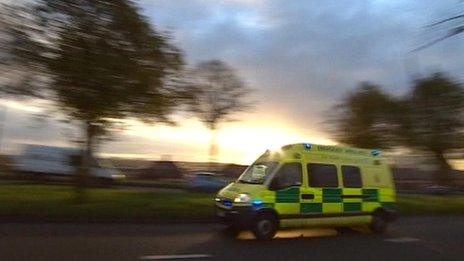East Midlands Ambulance Service: Private ambulance surge defended
- Published

EMAS has missed some emergency response times targets for three years running
A surge in the use of private ambulances has been defended by East Midlands Ambulance Service (EMAS).
In 2010/11, 12 emergency journeys were handled by private vehicles but this jumped to 246 in 2012/13, with the cost rising from £638,000 to £3.5m.
Bosses at EMAS said private firms had to meet high standards and allowed the service to cope with peaks in demand.
But Unison said it was vital that money was invested in the NHS rather than given to outside firms.
In April, shadow health secretary Andy Burnham claimed a national rise in the use of private ambulances meant services were "being privatised without proper debate".
Service 'struggled'
The government accused Labour of "rank hypocrisy", saying private ambulances were introduced by the last government.
A spokesman for EMAS said: "Private ambulance services provide qualified paramedics and urgent care ambulance crews who have the same skills and qualifications as our paramedics and urgent care crews.
"We use them in the same way to enable us to provide a fast response and quality emergency clinical care at times of high demand."
They added the money to pay for private ambulances was short-notice cash to help with heavy demand.
Mark Ward, from Unison, said the service had faced a 6-7% annual increase in emergency calls.
"Because of under-funding, the service struggled to cope and turned to the private sector.
"But the new clinical commissioning groups have invested in new staff and we will see them coming on line in the next couple of months and that should make a real difference," he said.
Boss resignation
In 2010/2011 all 12 emergency journeys covered by private ambulance firms were undertaken by St John's Ambulance.
In 2012/2013, 150 of the 246 emergency journeys covered by private vehicles were undertaken by Amvale. The rest were handled by St John's Ambulance.
Mike Godfrey, CEO of Amvale, said: "We have rigorous standards which we have to meet and all our staff are fully qualified - people in our ambulances would see no difference in the level and quality of care they would receive.
"We provide the flexibility which allows the service to cope with periods of high demand, like in particular hot, or cold, weather."
EMAS has faced criticism for missing some response time targets. At the beginning of the month the service's chief executive Phil Milligan resigned.
- Published6 August 2013
- Published5 August 2013
- Published22 May 2013
- Published21 April 2013
- Published25 February 2012